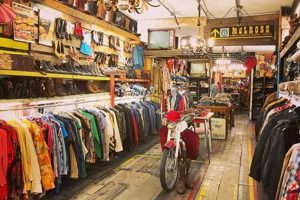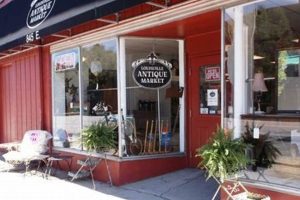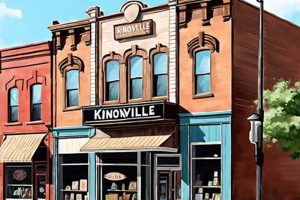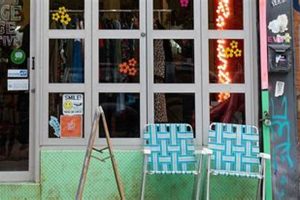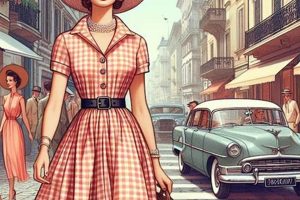Establishments in Spokane that specialize in the resale of previously owned clothing, accessories, furniture, and other items dating from past eras constitute a specific retail sector. These businesses offer a curated selection of goods, often representing specific decades or styles, catering to individuals seeking unique and pre-owned merchandise. Consider the prevalence of mid-century modern furniture finds within these specialized shops as a clear illustration.
The significance of these retail locations lies in their contribution to sustainable consumption practices through the promotion of reuse and recycling. They provide an alternative to fast fashion and mass-produced goods, reducing waste and supporting a circular economy. Furthermore, these stores preserve historical artifacts and design elements, offering a tangible connection to past generations and aesthetic trends. Historically, such businesses have served as accessible sources for affordable and distinctive items, particularly for budget-conscious consumers and those seeking individualized style.
The subsequent sections will delve into the array of offerings within these Spokane establishments, examining the types of merchandise typically available, the customer experience provided, and the broader economic and cultural impact of this retail segment. Exploration will also encompass factors influencing pricing, sourcing practices, and the evolving landscape of this specialized retail market.
This section presents guidance for individuals engaging with retail establishments specializing in pre-owned, historically significant goods. Adherence to these suggestions can enhance the consumer experience and maximize the potential for successful acquisition.
Tip 1: Research Prior to Visiting: Investigate store specialties and inventory through online platforms or direct contact. This preliminary assessment ensures the targeted establishment aligns with specific needs and preferences, optimizing visit efficiency.
Tip 2: Assess Garment Condition: Thoroughly inspect potential purchases for signs of wear, damage, or irreversible alterations. Pay close attention to seams, zippers, and fabric integrity to mitigate the risk of acquiring compromised items.
Tip 3: Evaluate Pricing Transparency: Compare prices across multiple establishments and consider the item’s condition, rarity, and provenance when assessing value. A critical evaluation of cost-benefit ratios promotes informed purchasing decisions.
Tip 4: Understand Return Policies: Clarify return and exchange policies before finalizing transactions, as these stipulations vary widely among retail locations. Documented confirmation of these terms safeguards against potential post-purchase discrepancies.
Tip 5: Consider Alteration Costs: Factor in the potential expenses associated with alterations or repairs when evaluating the overall cost of garments. Addressing fit or addressing minor imperfections often necessitates additional financial investment.
Tip 6: Engage with Sales Personnel: Inquire about the item’s history, sourcing, and care instructions. Direct communication with staff may yield valuable insights and inform preservation strategies.
Tip 7: Prioritize Authenticity Verification: Exercise caution when acquiring items purported to be of significant historical value or from renowned designers. Independent authentication services provide verification and mitigate the risk of purchasing fraudulent merchandise.
Consistent application of these recommendations facilitates informed decision-making, minimizes potential risks, and enhances the overall experience when engaging with retail locations offering pre-owned and historically significant goods.
The following sections will further explore the economic and cultural impact of these specific Spokane establishments.
1. Unique Inventory
The availability of distinctive, often irreplaceable merchandise is a defining characteristic of Spokane establishments that specialize in pre-owned, historically significant goods. This singular selection distinguishes these retailers from mainstream commercial outlets, fostering consumer interest and contributing to the overall appeal.
- Sourcing Diversity
The provenance of items significantly contributes to the uniqueness of the inventory. These stores typically acquire merchandise from estate sales, private collections, antique auctions, and individual consignments. This diverse sourcing network ensures a continuous influx of novel items, preventing inventory stagnation and catering to varying consumer tastes.
- Era Representation
Individual establishments often specialize in specific eras or styles, such as mid-century modern furniture, vintage clothing from the 1920s, or antique industrial equipment. This curated selection caters to niche interests and provides a focused shopping experience for consumers seeking particular historical periods or design aesthetics. Furthermore, the variability in era representation across different retailers contributes to the overall diversity of Spokane’s offering.
- Rarity and Scarcity
The finite nature of historically significant goods inherently creates an element of scarcity. Many items are no longer in production, making their availability limited and desirable to collectors and consumers seeking unique, one-of-a-kind pieces. This inherent scarcity contributes to the perceived value and desirability of the merchandise, impacting pricing strategies and consumer demand.
- Condition Variability
Unlike new merchandise, items typically exhibit varying degrees of wear and age. This variability in condition, ranging from pristine to distressed, further contributes to the inventory’s individuality. While some consumers prioritize pristine condition, others appreciate the patina and character that age imparts, finding value in the imperfections and historical context reflected in the item’s physical state.
The confluence of these elements diverse sourcing, era representation, inherent scarcity, and condition variability collectively defines the “unique inventory” characteristic of Spokanes retail locations focused on pre-owned, historically significant items. This unique offering is a key driver of consumer interest and a fundamental component of the overall appeal of these specialized establishments.
2. Sustainable Practices
Sustainable practices are intrinsically linked to the function of establishments in Spokane specializing in pre-owned, historically significant goods. The core business model of these retailers inherently promotes environmental responsibility through the reuse and repurposing of existing merchandise. This contributes to a reduction in waste and a lessened demand for the production of new goods, aligning with principles of sustainable consumption.
- Waste Reduction Through Reuse
Retail locations focused on items from past eras directly combat textile waste by extending the lifespan of clothing, furniture, and other goods. Instead of discarding these items, businesses offer them for resale, diverting them from landfills and reducing the environmental burden associated with disposal. Real-world examples include vintage clothing stores preventing wearable garments from becoming refuse and antique furniture shops giving new life to older pieces. This practice reduces the need for resource-intensive manufacturing of new products.
- Reduced Demand for New Production
By providing a viable market for pre-owned goods, these businesses lessen consumer reliance on the production of new items. This reduction in demand for new production translates into lower energy consumption, decreased raw material extraction, and minimized pollution associated with manufacturing processes. For example, an individual purchasing a vintage dress from a Spokane store is effectively reducing the demand for a newly manufactured garment, conserving resources and decreasing industrial emissions.
- Promotion of Circular Economy
Spokane establishments centered on items from past eras contribute to a circular economic model, where resources are kept in use for as long as possible, extracting maximum value from them. This contrasts with a linear “take-make-dispose” economy. They facilitate the continuous flow of goods through resale, repair, and repurposing. An example of this includes the upcycling of vintage furniture, where older pieces are refurbished and updated, extending their usability and aesthetic appeal while reducing waste.
- Environmental Awareness Advocacy
Many establishments championing pre-owned goods actively promote environmental awareness and sustainable consumer choices. Through educational initiatives, marketing campaigns, and community outreach, these retailers encourage conscious consumption habits and inform customers about the environmental benefits of buying secondhand. Some stores may highlight the carbon footprint reduction associated with purchasing used items or partner with environmental organizations to promote broader sustainability goals. These efforts contribute to a more environmentally conscious consumer base in Spokane.
The sustainable practices inherent in these Spokane retail models provide tangible environmental benefits, contributing to waste reduction, decreased resource consumption, and the promotion of a circular economy. The function of these establishments, therefore, extends beyond mere retail transactions to encompass a broader commitment to environmental stewardship and responsible consumption habits.
3. Local Economy Support
The role of Spokane establishments specializing in pre-owned, historically significant goods extends beyond mere retail, significantly contributing to the support and strengthening of the local economy. This contribution manifests through diverse avenues, each playing a critical role in fostering economic vitality within the community.
- Job Creation and Retention
These establishments necessitate a workforce for various operational facets, including sourcing, restoration, sales, and marketing. The creation of these positions provides employment opportunities for local residents, contributing to a reduction in unemployment rates and an increase in household income. Furthermore, successful Spokane operations often retain employees long-term, fostering skill development and stability within the local labor market. Examples include roles such as vintage clothing curators, antique furniture restorers, and sales associates specialized in historically significant items.
- Revenue Generation within the Community
Sales generated by these establishments contribute directly to the local tax base. Sales tax revenue supports essential municipal services such as infrastructure maintenance, public safety initiatives, and educational programs. Moreover, a portion of the revenue is often reinvested within the community through supplier relationships, local marketing initiatives, and community sponsorships, further stimulating economic activity. An example would be a store using a local printing company for promotional materials, supporting another business within the community.
- Attracting Tourists and Visitors
Unique offerings associated with establishments specializing in pre-owned and historically significant goods can act as a draw for tourists and visitors. These individuals, in turn, spend money at hotels, restaurants, and other local businesses, generating additional revenue for the community. The presence of a thriving retail sector focused on items from past eras enhances Spokane’s appeal as a destination for individuals seeking unique shopping experiences and cultural immersion. The stores benefit from increased foot traffic while also supporting adjacent businesses.
- Support for Local Suppliers and Artisans
These retail locations often collaborate with local suppliers for items such as cleaning and restoration supplies, display fixtures, and packaging materials. This reliance on local suppliers strengthens the regional economy by supporting independent businesses and creating a ripple effect of economic activity. Furthermore, some establishments may showcase the work of local artisans, providing a platform for their creations and contributing to the growth of the arts and crafts sector within the community. Such collaborations allow artisans to reach a wider audience while supporting the store’s unique identity.
In conclusion, these contributions highlight the multifaceted impact of stores in Spokane that sell items from past eras. Their impact is shown by job creation to visitor attraction, revenue generation, and collaboration with local suppliers. These businesses function as vital components of the regional economy, fostering growth, sustainability, and community enrichment. They serve as a tangible example of how specialized retail can significantly contribute to local economic vitality.
4. Nostalgia and History
The connection between nostalgia and history is fundamentally intertwined with establishments in Spokane specializing in pre-owned, historically significant goods. These retail locations capitalize on the inherent human desire to connect with the past, offering tangible links to specific historical periods and evoking feelings of nostalgia through the curated selection of merchandise.
- Tangible Connections to Past Eras
These retail locations provide consumers with direct access to artifacts from previous eras, offering tangible connections to historical periods and cultural trends. These items, whether clothing, furniture, or decorative objects, serve as physical reminders of specific times and places, fostering a sense of connection to the past that transcends mere historical documentation. An individual encountering a 1950s dress in such a shop is not simply viewing an object; that individual is engaging with a material representation of a specific cultural moment, complete with its aesthetic values and social contexts. This material connection is a core element of nostalgic appeal.
- Evocation of Personal Memories and Associations
Specific items found in the mentioned establishments often trigger personal memories and associations for shoppers. A particular style of furniture may remind an individual of their childhood home, or a piece of jewelry might evoke memories of a beloved family member. This personal connection enhances the emotional value of these objects and strengthens the link between the consumer and the historical era represented. Nostalgia, in this context, is not solely about history; it is about the intersection of personal experiences and collective memories, facilitated by tangible objects from the past.
- Preservation and Reinterpretation of Historical Styles
Retail establishments specializing in vintage and antique goods play a crucial role in preserving and reinterpreting historical styles. By curating and showcasing items from past eras, these businesses contribute to the continued appreciation of historical aesthetics and design principles. The act of acquiring and incorporating items into contemporary settings demonstrates a reinterpretation of historical styles, allowing consumers to integrate the past into their present lives. The preservation effort extends beyond simple storage; it involves active engagement with and celebration of historical design, impacting contemporary aesthetics and consumption patterns.
- Counterpoint to Contemporary Consumerism
The focus on pre-owned and historically significant goods offers a counterpoint to the often-disposable nature of contemporary consumer culture. These establishments provide an alternative to mass-produced, trend-driven merchandise, appealing to individuals seeking unique items with inherent value and historical context. The act of purchasing vintage is often viewed as a rejection of fleeting trends and an embrace of lasting quality and historical significance. This counterpoint serves as a powerful driver of consumer interest and a key element of the appeal of the vintage retail sector.
The confluence of these elements underscores the deep connection between nostalgia, history, and the function of these retail spaces. They provide more than simply merchandise; they offer an engagement with the past, a connection to personal memories, and a tangible alternative to contemporary consumer culture, all contributing to the enduring appeal of these businesses in the Spokane community and beyond.
5. Community Hubs
Establishments specializing in pre-owned, historically significant goods frequently transcend the conventional retail model, evolving into integral community hubs. Their significance extends beyond commercial transactions, fostering social interaction, cultural exchange, and a shared appreciation for history and craftsmanship within the Spokane area.
- Event Hosting and Social Gatherings
Retail spaces commonly host events such as fashion shows, live music performances, and workshops related to vintage styling, antique restoration, or historical crafts. These activities draw community members together, creating opportunities for social interaction and shared learning experiences. A store might host a monthly “Vintage Night” featuring local musicians and discounted vintage clothing, attracting a diverse crowd and fostering a sense of community ownership. Such events transform the retail space into a venue for social engagement, enriching the communitys cultural landscape.
- Collaboration with Local Artists and Businesses
These businesses actively collaborate with local artists, designers, and other businesses, showcasing their work and fostering cross-promotion. They might feature art exhibitions by local painters, stock handcrafted jewelry from regional artisans, or partner with nearby cafes for joint promotions. These collaborations strengthen the local economy and create a network of interconnected businesses that support each other. Displaying local art within the establishment provides a platform for artists to reach a wider audience, while simultaneously enhancing the store’s aesthetic appeal and community relevance.
- Spaces for Knowledge Sharing and Education
Certain establishments provide spaces for informal knowledge sharing and education related to history, fashion, and craftsmanship. They may host lectures on vintage fashion trends, offer workshops on antique furniture restoration techniques, or provide resources for researching historical artifacts. These educational initiatives cater to individuals seeking to deepen their understanding of specific historical periods and enhance their practical skills. A store might maintain a small library of books and magazines related to vintage fashion and design, providing a valuable resource for customers interested in learning more about the history of clothing and style.
- Support for Local Charities and Causes
Many stores actively support local charities and causes, donating a portion of their sales or hosting fundraising events. This demonstrates a commitment to community well-being and reinforces the establishment’s role as a socially responsible entity. A store might donate a percentage of its monthly profits to a local homeless shelter or host a clothing drive to benefit families in need. By aligning their business practices with charitable giving, these stores cultivate a positive image and strengthen their ties to the community.
In summation, the previously discussed facets of the retail sector in Spokane that is based on historically significant and pre-owned merchandise underscore their function as dynamic community hubs. These businesses extend beyond basic trade, promoting an environment that fosters social interaction, cultural exchange, and mutual assistance. Their influence on the community’s social dynamics is an essential aspect of their contribution to Spokane.
Frequently Asked Questions
The subsequent section addresses common inquiries and clarifies prevalent misconceptions regarding Spokane establishments specializing in pre-owned, historically significant merchandise. The information aims to provide a clear understanding of the sector’s operations, offerings, and associated considerations.
Question 1: What defines merchandise eligibility within Spokane retail stores that offer vintage items?
Merchandise eligibility typically hinges on age, style, and historical relevance. While specific criteria vary among establishments, items generally date back at least two decades and represent distinctive design trends or manufacturing techniques from past eras. Authenticity and condition also influence an item’s suitability for resale.
Question 2: How are prices determined for vintage items sold within Spokane retail establishments?
Pricing methodologies incorporate factors such as item scarcity, condition, provenance, brand recognition, and current market demand. Retailers often conduct comparative analyses of similar items sold in online marketplaces, at auctions, and in other retail locations to establish competitive and justifiable price points.
Question 3: What assurances exist regarding the authenticity of purported vintage items?
While some retailers provide detailed item histories and provenance documentation, authentication protocols are not universally standardized. Prudent consumers exercise due diligence by inspecting items carefully, researching historical markers, and seeking expert appraisals when acquiring high-value or potentially misrepresented goods.
Question 4: Are returns and exchanges permitted for vintage items purchased in Spokane?
Return and exchange policies vary considerably across establishments. Certain retailers offer standard return windows, while others maintain a “final sale” policy due to the unique nature of pre-owned merchandise. Consumers are advised to clarify the specific return stipulations before completing any transaction.
Question 5: What cleaning and restoration practices are employed for vintage garments and furniture?
Cleaning and restoration methods depend on the material composition and condition of the item. Professional cleaning services, gentle detergents, and specialized repair techniques are often employed to preserve the integrity of vintage goods while addressing superficial damage. Retailers prioritize methods that minimize further degradation or alteration of original materials.
Question 6: Do these establishments contribute to Spokane’s local economy and sustainability efforts?
Spokane businesses that sell historically significant and pre-owned goods have a positive effect by encouraging the re-use of items and decreasing the demand for new production, thus minimizing waste. Also, jobs are created locally and the draw of unique items assists by drawing in tourists, and stimulating supplementary revenue for businesses in the nearby area.
This FAQ section offers insight to the essential characteristics of Spokane stores that sell items from the past. A clearer comprehension of the processes and aspects that are essential can assist in guiding customers and vendors through the particulars of this niche retail market.
The next section will elaborate on potential future changes and expansions in this market sector in Spokane and its impact on the surrounding community.
Concluding Observations on Spokane Vintage Stores
This exploration has illuminated the multifaceted role of Spokane establishments that focus on pre-owned, historically significant merchandise. They function as retail outlets, centers for sustainability, pillars of the local economy, repositories of nostalgia and history, and essential community hubs. The unique inventory, sustainable practices, economic contributions, historical significance, and community engagement collectively define this sector’s impact on the Spokane landscape.
The continued success and evolution of Spokane’s unique shops will require ongoing attention to authenticity, responsible sourcing, and adaptation to changing consumer preferences. Supporting these establishments ensures preservation of local history, promotion of sustainability, and the strengthening of Spokane’s cultural identity. The future vitality depends upon conscious consumer choices and the sustained appreciation for the value inherent in items from past eras.


